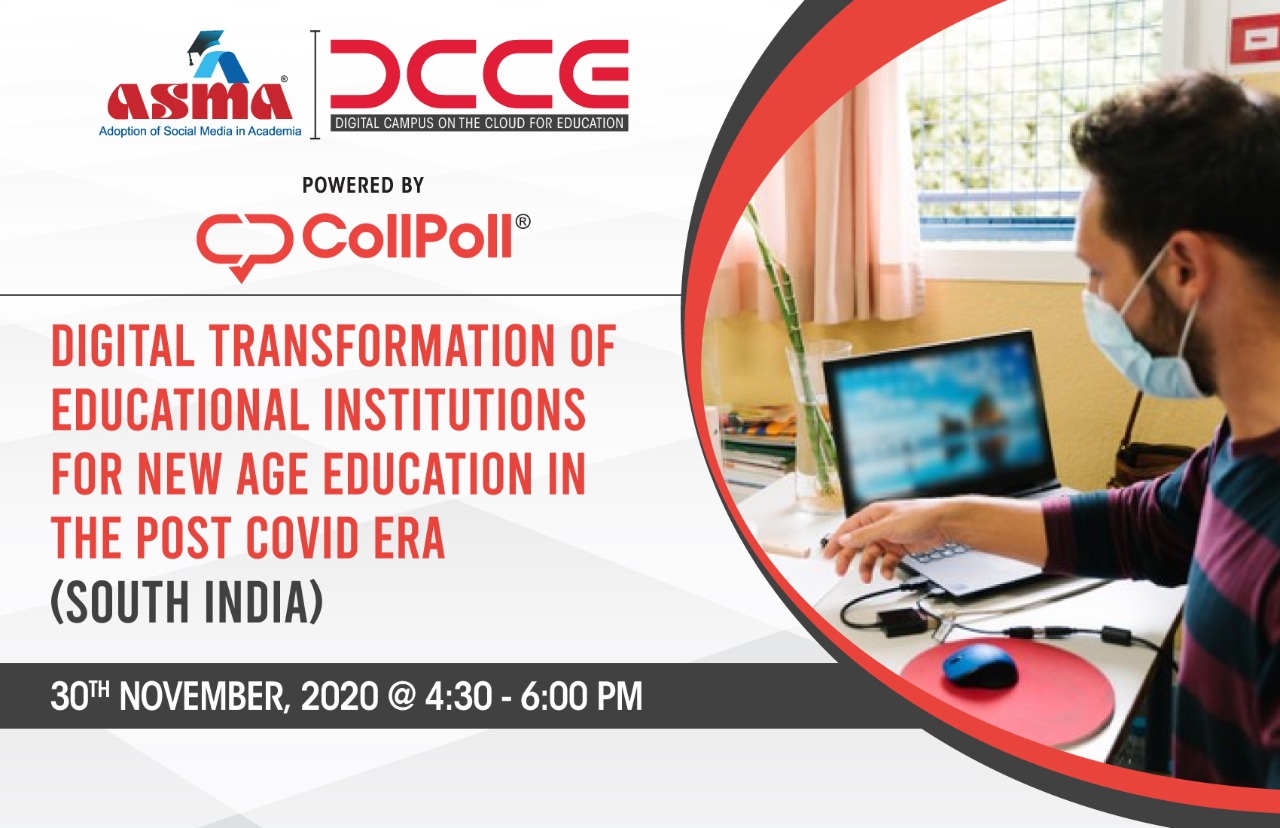Online Learning Will Be Permanent, Say Education Leaders at DCCE- South India Chapter
The virtual event was held on 30th November 2020 under the theme ‘Digital Transformation of Educational Institutions for New Age Education in the Post COVID Era’
The Digital Campus on the Cloud for Education (DCCE) South India Chapter powered by CollPoll was held on 30th November 2020. The virtual event was held under the theme ‘Digital Transformation of Educational Institutions for New Age Education in the Post COVID Era’.
The panel discussion was moderated by Hemant Sahal, Founder & CEO, Collpoll and comprised of eminent leaders from the education industry including Dr SS Mantha, Chancellor, KL University, Guntur, Dr P Shyama Raju, Chancellor, REVA University, Bangalore, Dr T Sasipraba, Vice-Chancellor, Sathyabama Institute of Science and Technology, Chennai, and Dr Sandeep Sancheti, Vice-Chancellor, SRM Institute of Science and Technology.
There was also an interesting industry presentation by Abhishek Ballabh, Co-founder of EduTech company, ExtraEdge on ‘Helping Admissions Teams Win’.
Speaking about the ways technology plays a positive role in facilitating learning beyond just online learning, Dr SS Mantha said, “No change will happen in a business as usual environment. The pandemic has forced the change. In the future, a lot of debate will take place at the cost of education. Because of the data we have today, we are able to distinguish what kind of learning must happen and what kind of courses can actually be taught online. Those courses that can actually be shifted online, if they go online even after the pandemic, the question is can the cost come down?”
Dr Mantha continued, “The second point of intervention in the future is bringing in the element of experiential learning. Applied Sciences are not devoid of lab work and building competency-based skills, therefore, some connect must happen”.
He added, “The future of education will seriously look at personalised learning and become completely student-centric; this perfectly possible because of the NEP intervention of multi-point entry and exits, and the academic credit bank concept”.
He also said, “The curriculum must undergo a change to make students more employable and this can be built online”.
Dr T Sasipraba, Vice-Chancellor, Sathyabama Institute of Science and Technology, Chennai said, “With the use of remote learning technologies, we have been able to conduct classes and examinations and complete our academic session successfully. However, we need to concentrate on laboratory sessions such as hard-core engineering subjects such as Mechanical Engineering and Civil Engineering, along with lab and research activities need to be done in person”.
Sharing her thoughts on the use of analytics by institutions in a data-driven approach to decision making, Dr Sasipraba added, “Many institutions in India are not using and maintaining data properly due to the lack of technological support and the lack of awareness. The different ways in which we are submitting data needs to be standardised through technology”.
She also added, “Blended learning will be the future and online learning will be permanent. Post the pandemic there will also be a lot of international collaborations’.
Speaking about how his institution took classes online during the lockdown, Dr P Shyama Raju, Chancellor, REVA University, Bangalore remarked, “We first trained our teachers. At REVA our goal was by 2020 would become completely digital and we were able to complete 95% of our classes online”.
He continued, “We are completely prepared for online, offline or any mode of teaching depending on what parents opt for”.
“We will have more student-centric education where technology will play a major role”, he added.
Adding his thoughts to the discussion, Dr Sandeep Sancheti, Vice-Chancellor, SRM Institute of Science and Technology opined, “Before the pandemic, we have been compromising by shunning technology for a very long time. Today, the adoption of technology is basically to ensure survival, rather than for excellence. Let us accept that this is a transitory phase”.
He added, “Teaching and learning have become asymmetric. Once technology comes into our lives, it is very difficult to take it away and this also applies to technology in education. Online learning will be permanent regardless of if we continue with offline learning in the future”.



